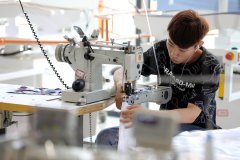Mideast's largest mall operator to expand amid vaccine hopes
The Middle East’s largest operator of malls expects revenue and earnings to climb back to pre-pandemic levels by the end of next year and is moving full steam ahead with plans to develop its biggest mall ever
April 15, 2021, 2:41 PM
5 min read
Alain Bejjani, CEO of the Majid Al Futtaim Group, talks to The Associated Press at the Mall of the Emirates in Dubai, United Arab Emirates, Thursday, April 15, 2021. The Middle East's largest operator of malls, Majid Al Futtaim, expects revenue and earnings to climb back to pre-pandemic levels by the end of next year and is moving full steam ahead with plans to develop its biggest mall ever. (AP Photo/Kamran Jebreili)
DUBAI, United Arab Emirates -- The Middle East's largest operator of malls expects revenue and earnings to climb back to pre-pandemic levels by the end of next year and is moving full steam ahead with plans to develop its biggest mall ever.
In a wide-ranging interview with The Associated Press on Thursday, Majid Al Futtaim CEO Alain Bejjani said business is steadily rebounding amid vaccine rollouts in some countries of the region, kicking 2021 off to a relatively strong start.
“We’re not out of the woods across the markets, but things are improving,” Bejjani said. “Going back to the pre-pandemic levels— to 2019 level— in my opinion, will happen by the end of 2022 in terms of financial results."
The company's plethora of retail and leisure holdings include the iconic Mall of the Emirates in Dubai, hundreds of VOX cinema screens and more than 350 Carrefour grocery stores in the Middle East and beyond. Named after its Emirati billionaire founder, the company's largest markets are the United Arab Emirates, Saudi Arabia and Egypt, but its reach extends as far as Pakistan, Kenya and Uzbekistan.
The company's projections of a rebound and its plans for expansion reflect the faster than anticipated recovery of Middle East economies from the coronavirus pandemic, though uneven vaccine distribution remains a concern.
Majid Al Futtaim, which employs some 43,000 people regionally, saw its revenue plummet by 7% to $8.9 billion last year and earnings drop by 19% to around $1 billion due to coronavirus lockdowns and restrictions. The hardest-hit side of the business was its leisure and entertainment arm, where revenue fell by 49% to $380 million and earnings plummeted by 122%, resulting in losses of $25 million.
Despite last year's slump, Majid Al Futtaim plans to unveil 30 new movie theater screens this year in Saudi Arabia, is developing it’s biggest mall project ever in Riyadh, and is opening what will be the largest mall in Oman at the end of 2021.
“Every country has had their own set of challenges to deal with. The reality is the fastest recovery is the UAE... and we expect very fast recoveries in other markets like Saudi Arabia,” Bejjani said. “We have also seen Egypt being very resilient.”
The United Arab Emirates has rapidly rolled out COVID-19 vaccines, which are free of charge for citizens and residents. Saudi Arabia is also expanding its vaccination rollout and has offered all residents free coronavirus treatment since the start of the pandemic.
It's not back to business as usual just yet, though. Majid Al Futtaim— like many businesses globally— is having to adjust to new realities, including the potential imposition of so-called “digital passports." In Bahrain, for example, where Majid Al Futtaim operates 30 cinema screens, only people who've been vaccinated or recently recovered from COVID-19 will be allowed into cinemas, gyms and other select spaces soon.
Bejjani said the company is “very supportive of any measure” that gives customers the feeling of being safe.
“Whenever there is an additional regulation, that actually gives people even more certainty, I think this is a plus, whether it is the vaccine passport, whether it is something else,” he said. “At the end of the day, what’s important is that people want to go back to normal. People want to go back to consumption.”
The company's rapid growth and expansion since its inception in 1992 mirrors that of its home base of Dubai, where a frenetic construction boom has transformed it from a fishing village into one of the most talked about modern cities in the world. The company's economic rebound is also closely tied to that of Dubai's, where the International Monetary Fund expects the country's overall economy to grow this year by 3.2%.








